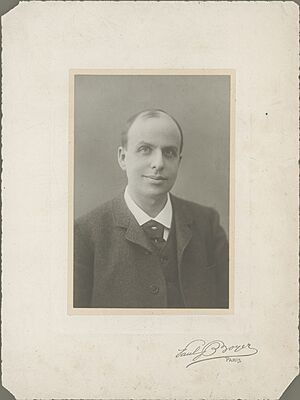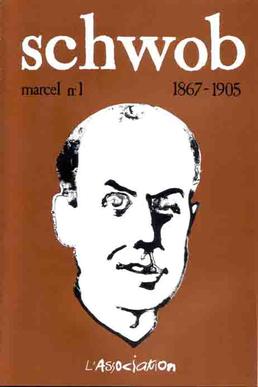Marcel Schwob facts for kids
Marcel Schwob (born August 23, 1867 – died February 26, 1905) was a French writer. He was known for his short stories and for influencing famous authors like Jorge Luis Borges. People even called him a "precursor of Surrealism," which means he had ideas similar to a later art movement. Besides over a hundred short stories, he also wrote newspaper articles, essays, biographies, and plays. During his life, he was very well-known and respected. He became friends with many important thinkers and artists of his time.
Contents
Early Life and Education (1867–1889)
Marcel Schwob was born in Chaville, France, on August 23, 1867. He came from a well-educated Jewish family. His father, George Schwob, was friends with famous writers like Théodore de Banville. His mother, Mathilde Cahun, came from a family of smart people from Alsace. Marcel was the brother of Maurice Schwob and the uncle of Claude Cahun.
His family had just returned from Egypt, where his father worked for the government. When a new French government began, the Schwob family lived in Tours. There, his father became the director of a newspaper. In 1876, they moved to Nantes for another newspaper job. After his father passed away in 1892, Marcel's older brother Maurice took over the newspaper.
When Marcel was 11, he discovered the stories of Edgar Allan Poe. He read them in French, then learned English to read the originals. Poe's writing greatly influenced Marcel throughout his life. In 1878–79, he studied at the Lycée (high school) of Nantes. He won the top prize for excellence there. In 1881, he moved to Paris to live with his uncle, who was a chief librarian. He continued his studies at another Lycée, where he became friends with Léon Daudet and Paul Claudel. Marcel was very good at languages and quickly learned many. In 1884, he discovered Robert Louis Stevenson, who became one of his friends and role models. He also studied languages and ancient texts at a special school in Paris. After that, he completed his military service in the artillery.
Marcel did not pass the entrance exams for a very selective school. However, he earned a Bachelor of Arts degree in 1888. He then became a professional journalist, writing for several newspapers.
Writing Career (1890–1897)
Marcel Schwob was very interested in French slang, especially the secret language used by a group called the Coquillards. This language was also used by the poet François Villon. Unlike what many believed at the time, Schwob thought that slang was not just made up on the spot. Instead, he believed it was a secret, coded language.
For eight years, he wrote many short stories. These stories were collected into six books:
- Cœur double (meaning "Double Heart", 1891)
- Le roi au masque d'or ("The King in the Golden Mask", 1892)
- Mimes (1893)
- Le livre de Monelle ("The Book of Monelle", 1894)
- La croisade des enfants ("The Children's Crusade", 1896)
- Vies imaginaires ("Imaginary Lives", 1896)
His longest short story, "L'étoile de bois," was published in 1897. Two big collections of his stories were also published during his lifetime. These were La porte des rêves (The Gate of Dreams, 1899) and La lampe de Psyché (Psyche's Lamp, 1903).
Marcel Schwob also helped Oscar Wilde with his play Salome. Wilde wrote it in French because a British law stopped plays about Bible characters. Wilde found French difficult, so Marcel Schwob checked and corrected the play. It was first performed in Paris in 1896.
Later Years (1898–1905)
In the last eight years of his life, Schwob was often too sick to work. Still, he managed to finish several projects. He wrote articles, introductions, and essays. He also adapted and translated plays. He planned many other projects, but they were not finished when he passed away.
Travels and Adventures
Marcel Schwob hired a young Chinese scholar named Ting Tse-Ying. Ting was from Saint-Louis, Senegal, and spoke English very well. Schwob met him at a big exhibition in Paris in 1900. Ting became Schwob's helper and travel companion.
In 1901, with Ting's help, Schwob traveled to Jersey and then to Saint-Martin-d'Uriage. He hoped these trips would improve his health. Then, he started the biggest journey of his life: a trip to Samoa. He wanted to visit the tomb of his hero, Robert Louis Stevenson. He sailed from Marseilles, stopping in places like Port Said, Djibouti, and Sri Lanka. He finally reached Vailima, Samoa, where Stevenson had lived. He met people who had known Stevenson there. Schwob stayed for less than a month. He became very sick on the island and lost a lot of weight. He had to rush back to Paris without visiting the tomb. Sadly, because of unfair treatment due to his race, Ting was sometimes stopped from going with Schwob on parts of the trip. Schwob wrote letters complaining about this.
In 1904, a friend invited him on a boat trip to Naples. Schwob went with Ting. They stopped in Porto, Lisbon, and Barcelona. He stayed for two weeks at his friend's villa in Sorrento. He got bored and left for France. He stopped in several places, including Aix-les-Bains, where his wife joined him. His health got worse, and they returned to Paris.
Friends and Family
Throughout his life, Marcel Schwob was friends with many famous people in art and literature. Some of his notable friends included Paul Claudel, Anatole France, Oscar Wilde, Alfred Jarry, Marcel Proust, and Colette.
In 1903, Schwob felt sad about losing several close friends who were famous at the time. He wrote to a friend, saying that Robert Louis Stevenson, Paul Verlaine, and others had passed away. The writer Aleister Crowley also considered Schwob a friend.
The two most important people in Marcel Schwob's personal life were a young woman named Louise and the famous actress Marguerite Moreno. Schwob met Louise in 1891. He kept their relationship private and later destroyed most of their letters. After two years, she passed away from a lung illness. He was heartbroken. He dedicated his book Le livre de Monelle to her. The main character in the book was based on Louise, but she was written as a child. Many people believe this book was his most personal work. It was the book he was most famous for during his lifetime.
In 1894, the year after Louise's death, Schwob met Marguerite Moreno. She was a well-known actress. In January 1895, they officially became a couple. They got married in London in 1900. Their relationship was a bit unusual. They spent a lot of time apart because of Moreno's acting career and Schwob's frequent travels.
Health and Passing
In 1896, Marcel Schwob became sick with a long-term stomach problem that could not be cured. He also often got illnesses like the flu or pneumonia. He had surgery on his intestines several times. In February 1905, after nine years of serious health issues, he passed away at age 37. He died of pneumonia while his wife was away on tour. His helper Ting, his brother Maurice, and his biographer were with him.
Teaching and Influence
Starting in December 1904, Marcel Schwob taught a course about the poet Villon. Many important people attended his classes, including Pablo Picasso and Max Jacob.
Many other artists and writers were influenced by Marcel Schwob's work:
- Paul Valéry dedicated two of his works to Schwob.
- Alfred Jarry dedicated his play Ubu Roi to Schwob.
- Oscar Wilde dedicated his long poem "The Sphinx" to Schwob.
- Schwob's book The Book of Monelle influenced The Fruits of the Earth by André Gide.
- The Children's Crusade influenced books by William Faulkner and Jerzy Andrzejewski.
- Jorge Luis Borges said his book A Universal History of Infamy was inspired by Schwob's Imaginary Lives.
Works by Marcel Schwob
Collections of Short Stories
- Cœur double ("Double Heart", 1891)
- Le roi au masque d'or ("The King in the Golden Mask", 1892)
- Mimes (1893)
- Le livre de Monelle ("The Book of Monelle", 1894)
- La croisade des enfants ("The Children's Crusade", 1896)
- Vies imaginaires ("Imaginary Lives", 1896)
Plays
- Jane Shore (written with Eugène Morand, 1900)
Non-Fiction Books
- Étude sur l'argot français ("Study of French Slang", 1889)
- Spicilège (1896)
- Mœurs des diurnales ("Habits of Day Persons", 1903)
- François Villon (published after his death, 1912)
Translations and Adaptations Marcel Schwob translated many works from English to French, including:
- "The Selfish Giant" by Oscar Wilde (1891)
- Moll Flanders by Daniel Defoe (1895)
- The Tragedy of Hamlet, Prince of Denmark by William Shakespeare (1900, for Sarah Bernhardt)
- Strange Case of Dr Jekyll and Mr Hyde (a play adaptation, 1900)
Adaptations of His Work
Music
- An Oratorio (a large musical work) called La Croisade des Enfants was created by Gabriel Pierné in 1902. It is his most famous piece.
Film
- Il re della maschera d'oro (1920) was a silent film based on Le roi au masque d’or.
- The classic film L'Atalante (1934) seems to be inspired by Schwob's story "Bargette."
Comics
- The comics anthology Lapin #16 (1997) was dedicated to Schwob. It included comic adaptations of three of his stories.
- Viktor (2007) was a comic adapted from his story "L’Étoile de bois."
- Le capitaine écarlate (2000) is a surreal comic where Schwob himself is the main character.
Theatre
- Monelle (2008) was a play based on Le livre de Monelle.
Radio
- A radio play called Histoire de Monelle was adapted from Le Livre de Monelle for a French radio program.
Images for kids
See also
 In Spanish: Marcel Schwob para niños
In Spanish: Marcel Schwob para niños





